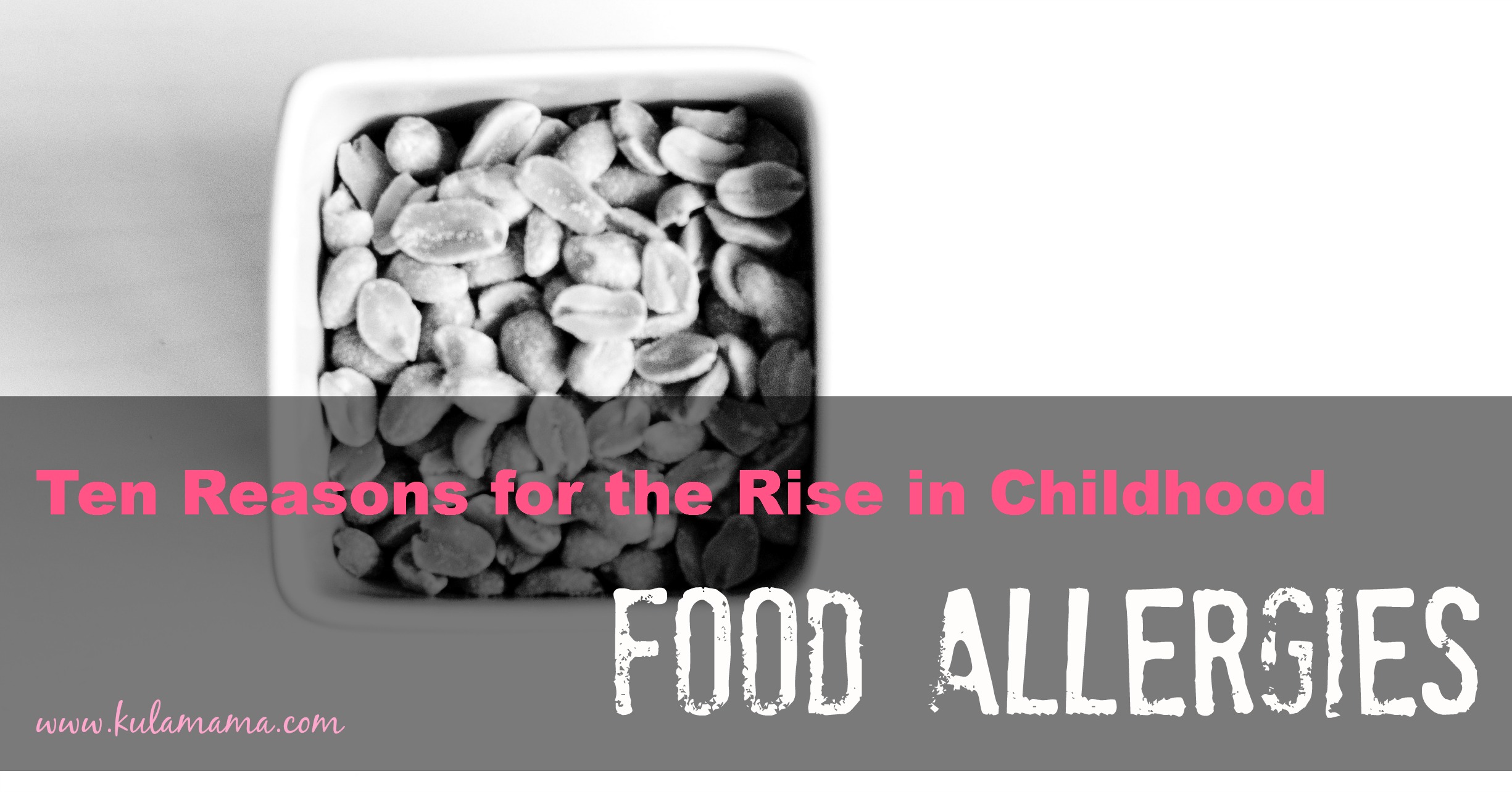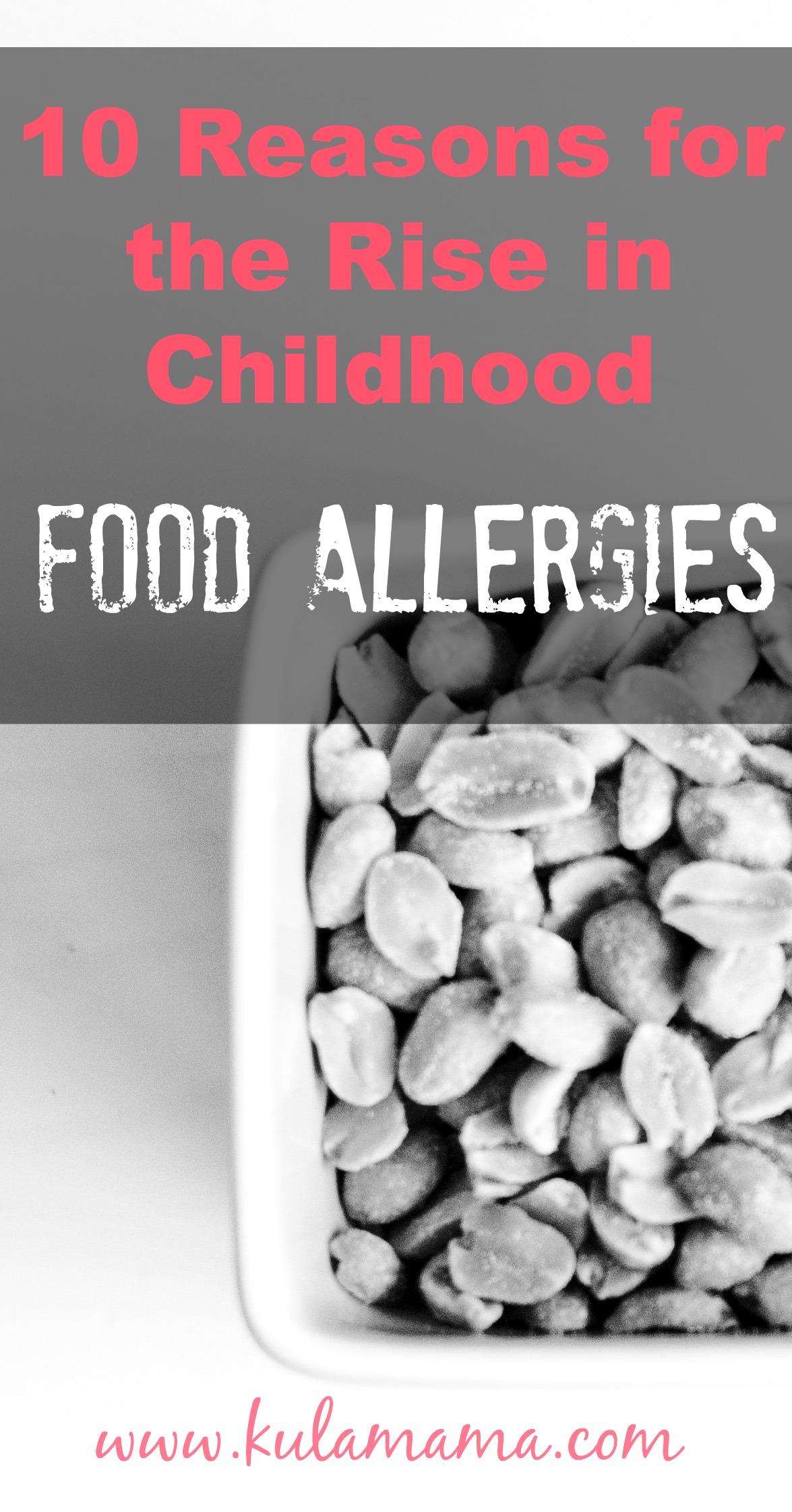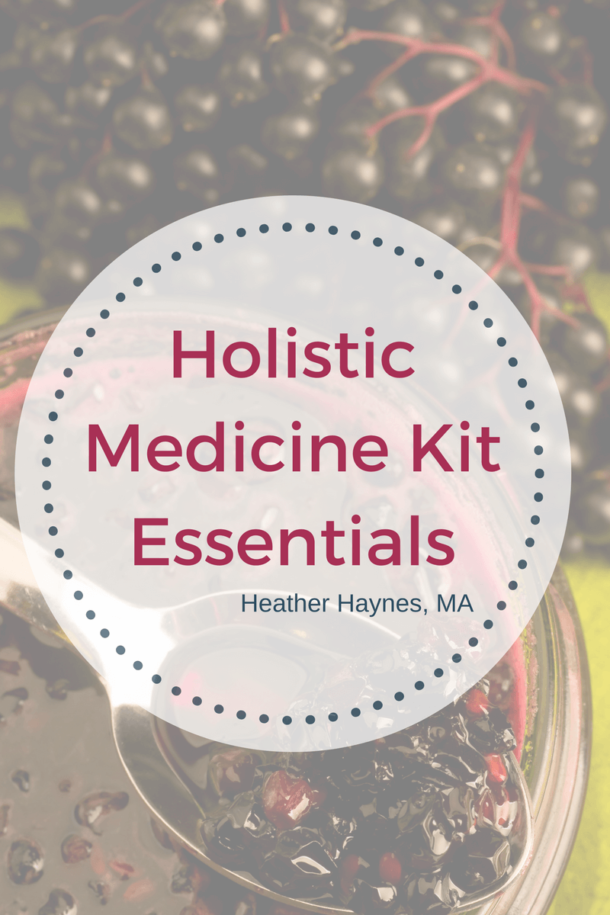Today’s generation of children is often referred to as the allergy generation. A child born today has a 1 in 12 chance of developing food allergies. (source) With the prevalence of serious allergies to foods such as peanuts, dairy, gluten and soy, it’s hard to imagine that our great-grandparents grew up in time when these allergies were almost non-existent.
Why is a child born today at a greater risk for developing food allergies? Why didn’t our great-grandparents have to worry about peanuts? There are many potential reasons for the rise in childhood food allergies. Science continues to explore an array of associated links and these 10 reasons for the rise in childhood food allergies give us plenty of food for thought.
10 Reasons for the Rise in Childhood Food Allergies
1. Leaky Gut in Pregnant or Nursing Mom
When a pregnant or nursing mom has leaky gut syndrome, her digestive flora is out of balance. A new baby’s digestive tract gets populated first when traveling through the birth canal and later through a mother’s breast milk. If a breastfeeding mother has unbalanced gut flora, her baby will have a hard time establishing a healthy, robust digestive function…setting the stage for gas, colic, eczema and allergies. (source 1, source 2)
2. Increased Consumption of Processed Foods
The processed food items lining supermarket shelves today are packed full of ingredients and chemicals that disrupt our digestion, immune function, hormone balance, behavior and neurological development. Babies and children are especially at risk to these processed foods because their immature digestive systems are unable to handle fake, refined and chemical ingredients. (source 1, source 2, source 3)
3. Genetically Modified Foods (GMOs)
Our children today are part of the largest, unregulated, forced science experiment in history: the consumption of GMOs. No scientific research was done on these foods before they hit the market in 1996 and new research done by concerned consumer groups show these genetically modified organisms are both toxic and allergenic. GMOs are restricted or banned in 30 countries and counting. In the United States GMOs are present in the majority of packaged foods and currently the USA has no labeling requirements for genetically modified ingredients. (source)
4. Increased Exposure to Environmental Toxins
We are exposed to double the amount of environmental toxins associated with autism, ADHD, behavior and development disorders today than we were only 7 years ago. (source) The result? A generation of children with overburdened immune and detoxification systems. (learn more)
5. Antibiotics in Food (and Antibacterial Living in General)
When children eat conventional meat and dairy products containing antibiotics, healthy gut flora in the digestive tract is killed. Additionally, our overly sanitizing tendencies (think hand sanitizers and wipes) also disrupt the balance of flora in the digestive tract. Over 75% of the immune system resides in the gut. When gut flora is out of balance, the immune system cannot function properly. (learn more)
6. Decreased Consumption of Traditional, Real Food
Our ancestors knew the importance of nutrient-dense foods like eggs, cod liver oil, organ meats, bone broth and healthy saturated fats for proper immune function and brain development. Families today eat far less of these sacred foods. (source)
7. Modern Farming Practices
Modern farming methods strip our soils of valuable minerals. As a result our fruits and vegetables have less vitamins and minerals compared to the produce of generations past. This is especially true for children eating conventional produce. (source 1, source 2)
8. Decline in Traditional Methods of Food Preparation
Today’s generation of parents have lost touch with traditional preparation methods of food. Traditional preparation methods such as soaking and sprouting grains, legumes, nuts and seeds allow the body to properly absorb the nutrients from these foods. Our great-grandparents soaked and sprouted their grains while children today heat pre-packaged food in a microwave. (source 1, source 2
)
9. Current Vaccine Schedule
No matter what side of the vaccine debate you’re on, the fact of the matter is that children today are exposed to 49 doses of 14 vaccines before the age of 6, while their great-grandparents were exposed to 4. (source) Vaccines (by design) trigger the immune system in hopes of an antibody response to a desired antigen. However, studies have shown that vaccines can also cause antibody reactions to other ingredients in the vaccine (vegetable oils, egg, gelatin, casein). (source 1, source 2) When combined with environmental toxins, poor food choices and leaky gut issues, for some children vaccines could add more confusion to an already overwhelmed immune system.
10. A Lost Connection to Our Food Source
Our great-grandparents knew their local farmer and bought raw milk from cows in the neighborhood. The food our great-grandparents ate was local and nutrient-dense. Today children eat food trucked in from around the world and stored in a supermarket for weeks or months. The result? Lower quality food that contributes to lower quality health.
The Allergy Generation
Put this all together and it is easy to see why children today are more susceptible to food allergies. Because babies and children by definition have less developed digestive tracts, they simply cannot handle the barrage of toxic food, chemicals and stress thrown at them so early in life. The result of this toxic overload: LEAKY GUT + CONFUSED/OVERBURDENED IMMUNE SYSTEM = FOOD ALLERGIES.
Why do you think we are seeing an increase in childhood food allergies? What reasons would you add to this list?




I agree with this, and it really disappoints me. While some can be avoided easily, others – to me, at least – seem more difficult. Do you plan on publishing a follow-up post detailing how we might tackle some of these issues on a daily basis?
YES Leisa, I’m planning a follow up next week! Thanks so much for reading…
Honestly, I think the biggest reason there’s a rise is childhood allergies is that we protect our kids too much from germs. Without actual pathogens to fight, a child’s developing immune system will turn to fighting non-threats.
Here’s an article about the benefits of eating dirt as children and how it may lead to healthier immune systems as adults. http://www.thenakedscientists.com/HTML/news/news/1000071/
I completely agree, many of these issues are surely a problem in childrens health, BUT some of them are unrelated to allergies. It has been pretty well proven that allergies are a result of our overly clean culture which also includes poorly developed gut flora, NOT the result of overstimulating the immune system. I know that vaccines are a hot topic, but there is no need to draw them into every article. The research on allergies clearly states that more exposure to germs leads to a reduced likelihood of allergies.
All excellent points! So glad we made the switch to ‘real food’ when we did. I only hope our FDA starts making changes to our food system SOON so that the majority of people will eat better, too. It’s not fair.
I agree with you LeAnn.
Yes, yes and yes to all if these! With my first born, I ate a terrible diet of processed foods, refined sugars and flours and fast food. My daughter ended up developing eczema at 3 months old (I’m sure the hep b shot at birth exacerbated the condition) and went on to have respiratory issues (wheezing, develops coughs a lot, etc,), sensitive skin that turns bumpy, allergies, and a weakened immune system (she used to get sick all the time). I attribute all of these issues to my poor maternal diet because we have none of these conditions in our family history. I wish medical doctors would place more emphasis on pre conception and maternal diets. Oh how I wish I could turn back time.
I love this post! I completely agree with every point you made. My two children are 3 and 1 years old and have the following: FPIES, fructose malabsorption, and traditional IgE allergies. Thanks to their severe food issues, we cook 3 separate meals at each mealtime! It’s insane!
We don’t leave the house very often because our entire culture is centered around food – and bad food, at that! At their ages, I can’t keep my kids safe in the broader world from food that will hurt or kill them.
I’m so glad to see someone else pinpointing the causes of our kids allergies; I often feel like I’m shouting in the dark when I say things like this! (And if you’d like to learn more about FPIES, a rare allergic condition, that’s a large part of what I blog about – plus I share allergy friendly recipes.)
Thank you for this – do you mind if I share it? Hugs!
Hi, i have been looking for information on seasonal allergies. I think my 8 y.o. son started having them about a week ago, red eyes, watery, runny nose, sneezing. If you have anything on it, i would love to find ways to fight that off the natural way.
Hi Lilya, Lowering your son’s overall inflammation will help. If you research anti-inflammatory diets that will help. Also lavender essential oils have been known to help with seasonal allergies so that might be something to research too. Hope that helps and thanks for reading!
OK so one of the reasons for leaky gut is because moms breastfeed who have a leaky gut themselves but interesting enough every single website who writes about the connection doesn’t mention that formula has no connection?
Hi Candice, I put formula in the category of processed food–and I do talk about processed foods in this article so yes, I do think formula contributes to an imbalanced gut flora and can set the stage for increased gut permeability down the line. I agree with you! thanks for reading!
I would add birth method to the list. C-section children miss lots of the good microbes in the birth canal and can be a bit more vulnerable.
Great post – all true. You could add a few more things to the leaky gut category. Things that destroy gut flora like amalgam fillings, birth control pills & devices like the IUD, and corticosteroids, We wish doctors would let women know the real and long-term health hazards of these things.
My son has food allergies. I was eating tons of real food and even a full GAPS diet when pregnant with him I don’t have any allergies myself. Our allergist said that allergies are commonly inherited from the father (my husband does have bad allergies, though not food). So I do agree that some of these may be true, but I also don’t think it’s the whole story. As a mom eating all real, nourishing foods, breastfeeding for 2 years, etc. my son still has food allergies.
Hi Mary, I agree that our environment and genetics play a big role. Have you read Deep Nutrition? Fascinating about the role our ancestors play in our own genetic momentum–worth a look! Thanks for reading!